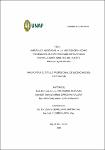Variables asociadas a la abatización como prevención de enfermedades metaxenicas en pobladores adultos del puerto Masusa, Iquitos-2017

View/
Date
2018Author
Fernández Guevara, José Arturo
Cárdenas Valera, Goretty Steffanie
Daza Hidalgo, Cindy Merian
Metadata
Show full item recordAbstract
El objetivo fue determinar la asociación entre las variables: edad, sexo, grado de instrucción, vivienda y conocimiento con la Abatización como prevención de enfermedades metaxénicas en pobladores adultos de 18 a 60 años de edad, de ambos sexos del Puerto Masusa, de la ciudad de Iquitos durante el año 2017.
La población fueron 1200 personas. La muestra conformada fueron 290 personas asignadas mediante muestreo no probabilístico por conveniencia. Las técnicas fueron la entrevista y la observación, los instrumentos fueron: El cuestionario sobre abatización (Validez 88,6% y confiabilidad de 86,6%, y una Guía de observación de abatización (Validez 91.6% y confiabilidad de 89,6%. Los datos fueron analizados con el programa SPSS 22.0. La prueba estadística inferencial fue el Chi Cuadrado, con α =0.05 y nivel de confianza de 95%. Los resultados son los siguientes: Resultados: en edad predominó con 69,7% (202) pobladores de mayor edad (30 a 60 años de edad); en sexo predominó con 93,1% (270) el sexo femenino; en grado de instrucción predominó con 56,2% (163) mayor grado de instrucción (secundaria completa o superior incompleta o completa; en vivienda predominó con 70,3% ( 204) viviendas insalubres. 85,5% (248) de pobladores con conocimiento adecuado sobre abatización, y predominio del 92,4% (268) de pobladores que no realizan la abatización en sus viviendas. Conclusión: Se obtuvo resultados estadísticos significativos entre edad y abatización (p= 0,024); sexo y abatización (p= 0,030); grado de instrucción y abatización (p= 0,038); salubridad de la vivienda (p= 0,000), y con conocimiento sobre abatización con abatización de la vivienda (p= 0,002). The objective was to determine the association between the variables: age, sex, educational level, housing and knowledge with the Abatization as prevention of metaxenic diseases in adult inhabitants of 18 to 60 years of age, of both sexes of Puerto Masusa, of the city of Iquitos during the year 2017. The population was 1200 people. The sample formed was 290 people assigned by non-probabilistic sampling for convenience. The techniques were the interview and the observation, the instruments were: The questionnaire on abasement (Validity 88.6% and reliability of 86.6%, and a guide to observation of abatement (Validity 91.6% and reliability of 89.6%. The data were analyzed with the SPSS 22.0 program, the inferential statistical test was the Chi square, with α = 0.05 and 95% confidence level, the results are as follows: Results: in age it prevailed with 60.7% (202) older residents (30 to 60 years of age), predominantly in sex with 93.1% (270) females, with a predominance of 56.2% (163) higher education (complete secondary or higher) incomplete or complete, in housing it predominated with 70.3% (204) unsanitary dwellings, 85.5% (248) of inhabitants with adequate knowledge about abatization, and 92.4% (268) of inhabitants who do not realize the reduction in their homes Conclusion: Statistical results were obtained if Gnificativos between age and abatización (p = 0.024); sex and ablation (p = 0.030); degree of instruction and ablation (p = 0.038); healthiness of the dwelling (p = 0.000), and with knowledge about abatization with housing demotion (p = 0.002).
Collections
- Tesis [251]
The following license files are associated with this item:

